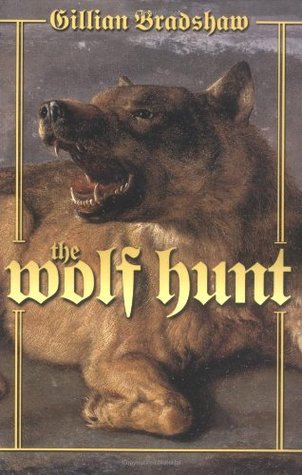 The Wolf Hunt, Gillian Bradshaw
The Wolf Hunt, Gillian Bradshaw
Review from 1st February, 2013
I was initially excited when I saw that this was based on the Breton lai ‘Bisclaveret’. I studied that lai in my first year of university, and I’ve had cause to go back to it fairly often since, and I rather like it. Perhaps especially because of the inevitable LGBT reading of it: it’s homosocial at the least, and then the other details make it very easy to read it as a homosexual love story. Bisclaveret is betrayed by his wife, and ultimately everything is set to rights by the king, who loves him very much — and the story includes a scene where Bisclaveret sleeps in the king’s bed… If you want to read more about that analysis, I suggest William Burgwinkle’s Sodomy, Masculinity and Law in Medieval Literature.
Anyway, so I was very disappointed when I looked closer and found that this story de-queers the original lai. It invents a whole new character, Marie, to be Bisclaveret’s ‘real’ love interest. I was much less inclined to let myself enjoy this, at that point.
But Gillian Bradshaw has a way of coaxing me along anyway, and I found myself reading big chunks at once. She really is a good writer, and ultimately I found it just as compelling as the other books I’ve read by her, despite my initial resistance. The lai still limits her, in some ways — Marie Penthièvre would be a wonderful heroine, but often we’re limited to Eline and her paramour Alain, neither of whom exactly fill me with warmth. I felt like there was an attempt to understand Eline, at times, but what she did just made it impossible to like her — and Marie’s understanding of her made Marie seem ridiculously saintly.
But for the most part I loved the characters: Marie, the duke, the duchess, Tiher… Even minor characters. Tiarnán, less so, because he makes a silly mistake of judgement when it comes to women. But he does learn from what happens to him, it seems.
Looking forward to the other Gillian Bradshaw books I’ve got on my to read pile.
Rating: 5/5

What language is the original written in?
It’s based on a Breton story, supposedly, but it’s written in 12th century French. There’s a Penguin translation of Marie de France’s work that includes a bit of the originals in the back, but that’s the closest I’ve come to the original!
I was curious because of reading this:
https://www.goodreads.com/book/show/16009963-six-middle-english-romances
where-in the stories are clearly from France but they’ve been re-written in (Middle) English.
Happened a looot with stuff like that, so it’s always hard to track down the original source.
Yes – one thing I learned from that book was that the cultural cross-over in both directions is a lot more complicated than I had previously realised.